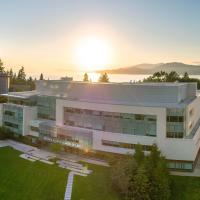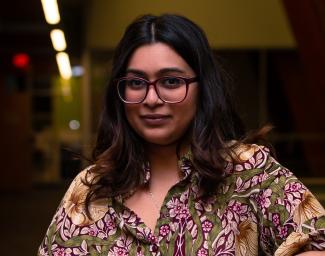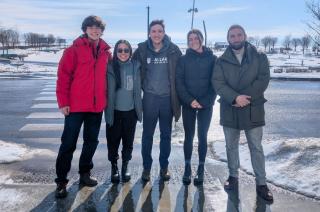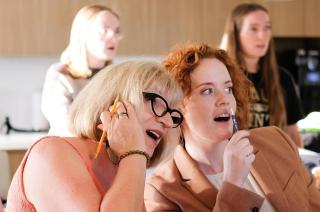Making sense of the 'legal void' in international refugee law: Meet PhD student Atreyi Bhattacharjee

Allard Law
Feb 4, 2022

Atreyi Bhattacharjee is a second-year doctoral student at the Allard School of Law. Over the years, she's interned with national and international NGOs, including Tenaganita, a Malaysian NGO that champions the rights of trafficked persons, refugees, migrant workers, women and children; Transparency International Malaysia, an NGO dedicated to fighting corruption; and Lawyers for Liberty, a non-profit law firm that aims to protect civil society rights in Malaysia.
She's also volunteered as an ad-hoc translator at Survival International, an NGO working to advance the rights of Indigenous communities around the world. During her master’s degree, Atreyi interned with the Human Rights, Rule of Law, Security, and Justice cluster at the UNDP Regional Hub for Central Asia and Turkey in Istanbul.
Atreyi grew up in Malaysia, obtained her bachelor’s degree in law from King’s College London and a Master’s in International and Comparative Law at the University of Helsinki in Finland.
Most recently, Atreyi received the Ian Townsend-Gault Memorial Graduate Research Award. The award supports outstanding students in research-based graduate programs at Allard Law, especially those conducting research in Asian law or international law. In this interview, she discusses her doctoral research on refugee protection commitments in Southeast Asia and strategies she’s adopted as she navigates grad school.
What influenced you to pursue graduate studies at Allard Law?
I realized quite early on that I wanted to pursue an academic career. While developing my doctoral project, I had to think about which law schools would make room for such a niche subject. I had narrowed it down to a few schools, including UBC. What cinched Allard Law for me was rather randomly meeting Professor Karin Mickelson in Helsinki.
She was teaching a summer course (in a pre-COVID world, of course) at Helsinki University’s Erik Castrén Institute, where I had been working as a research assistant. She was incredibly kind and gracious, and encouraged me to apply. I took her advice and here we are! I’ll always be thankful to her for taking the time to speak to a random overenthusiastic master’s student that one afternoon.
You seem really excited about your doctoral research project. Can you share a bit about it?
Bear with me, it’s a bit complicated, but I’ll try to make it as concise as possible. My project examines the legal void in formal refugee protection commitments in Southeast Asia. Most of the states in the region have categorically rejected the main tenets of refugee protection under international law – namely, the 1951 Refugee Convention and 1967 Protocol. This is well-known amongst international refugee law scholars.
I’m looking to better understand why rejection of the Convention necessarily means there must be a complete legal blackout in terms of refugee protection in the region. I explore the colonial histories of both refugee protection regimes as a whole, as well as of the Southeast Asian region to try and make sense of what is missing in the international refugee law regime. I rely on a few theoretical approaches in my study, primarily Third World Approaches to International Law and feminist legal theory.
I honestly don’t know if ‘excited’ is the word I would use for my specific project, because the subject matter is really heavy. Though, I am excited that I’m actually pursuing a PhD — I never thought I would have the opportunity to research an extremely perplexing issue that continues to affect real people's lives.
Growing up and working in the spaces that I did, I also worked with members of the Rohingya community. Their arduous journeys as refugees in Malaysia inspired me to do my part as an academic to try and change the deeply misguided narratives surrounding migration and refugee movements within the region especially, but also under international law more generally. I decided to examine the multiple Rohingya exoduses as the main case study for my project. But really, we’ve reached some of the highest numbers of displaced persons and refugees that the world has ever known. Something is clearly wrong. Every day that I get to spend working on figuring out the tiniest sliver of this problem as an immigrant student myself is a humbling reminder of my own privileges, and inspires me to keep at it.
In what ways would your research make an impact? What are the possible real-world applications?
I’m hopeful that my project will contribute an alternative understanding in refugee law scholarship of a bespoke problem. As with most researchers, I am hoping to push the envelope a little further, to ask harder questions, and to challenge my peers a little more so that collectively we might make a real difference over time.
Real-world applications are hard to tell so early on — I’m only in my second year of my PhD! People much, much smarter than I have dedicated their whole lives to enacting change. I’m just about managing my readings for comprehensive exams at the moment. Maybe ask me again in forty years?
How do you feel receiving the Ian Townsend-Gault Memorial Graduate Research Award? How will this award benefit your research?
Beyond grateful. I had no idea I was even nominated for the award. I genuinely thought there had been a mistake when I received the e-mail! I’m very thankful to the late Dr. Ian Townsend-Gault, and his wonderful family for encouraging research on Southeast Asia at Allard Law.
It’s really easy to doubt oneself as an immigrant student in a Western institution with such a particular research interest. Receiving the award has propelled me to not only live up to Dr. Townsend-Gault’s dedication to issues in Southeast Asia, but to encourage even more research on the region. It is really encouraging to know that support is available for burgeoning scholars.
What strategies have you adopted to help you through graduate school?
Remembering to take time off. I think most of my peers will agree that graduate school is extremely taxing, and we have a strong tendency to get sucked into intellectual rabbit holes at the drop of a hat. Moreover, it's difficult to stop yourself from thinking about your work all the time. It sounds simplistic, but it’s harder than you’d think. Considering the ongoing pandemic as well, our lives are consumed by screens and heaviness. Consciously choosing to take breaks has been instrumental in helping me cope with graduate school.
What would you say has been the highlight of your time at Allard Law and UBC so far?
I started my PhD remotely in 2020 because of pandemic travel restrictions. Figuring out my move to Vancouver was a process, and then some. I completed the whole of my first term from another continent. So, the highlight of my journey so far was definitely the day I managed to actually set foot on campus and visit Allard Law, exactly one year to the day that I received my offer letter from UBC. It was serendipitous.
Do you have any advice for incoming graduate students in terms of balancing the demands of graduate school?
I cannot emphasize this enough — be kind to yourselves. Grad school is hard enough, you don’t need to be harder on yourselves. Also, imposter syndrome is very real. Graduate school can be very isolating — after all, no one else is as invested in your intellectual project than you. Surround yourselves with a support system that reminds you that you deserve to be here just as much as anyone else. Don't hesitate to reach out to trusted people if you’re struggling. This too shall pass, and do not feel guilty for not working 24/7. Trust the process!
- Allard School of Law
- Graduate Programs
- Research


